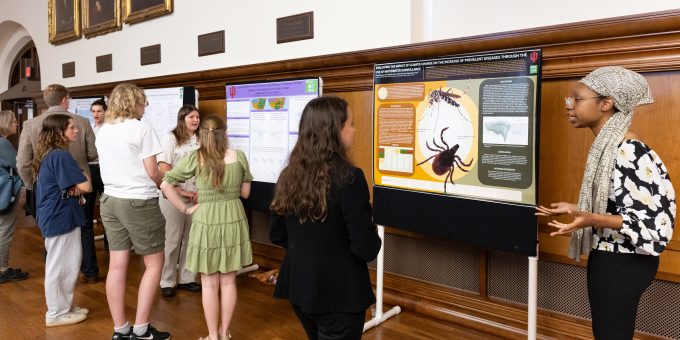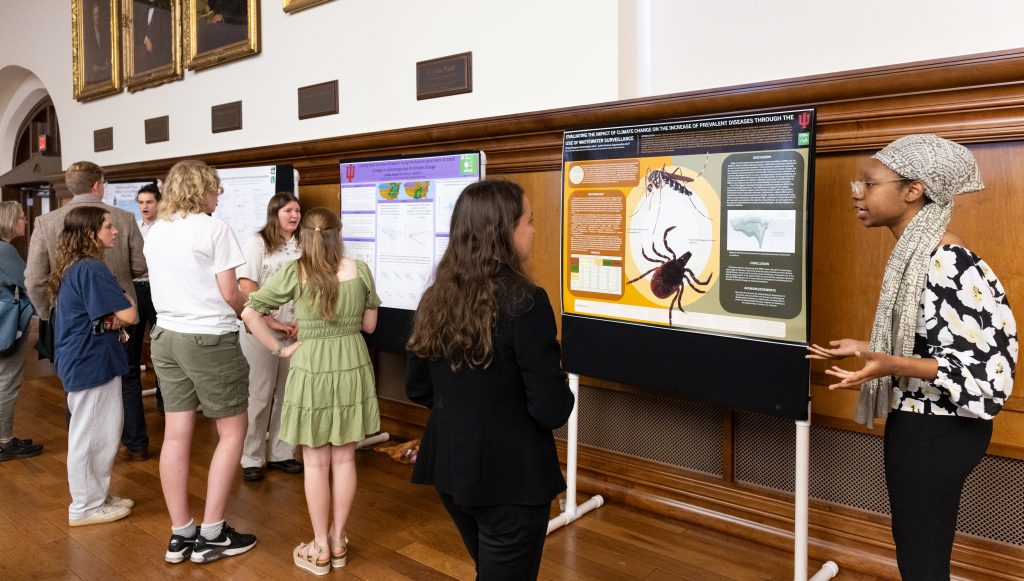
BLOOMINGTON – Indiana University environmental organizations honored students engaged in environmental and sustainability research and action across disciplines at the 2024 Sustainability Symposium.
The Integrated Program in the Environment (IPE), Environmental Resilience Institute (ERI), and IU Sustainability hosted.

The recipients spanned schools and departments. Their work exemplifies the breadth of environmental and sustainability studies at IU.
“It just proves that sustainability is not a topic that can be addressed by only one discipline,” said Dr. Sarah Mincey, director of IPE, managing director of ERI, and professor at the O’Neill School of Public and Environmental Affairs. “IU students are making tangible impacts on people’s lives and our environment right now.”

Through IPE, undergraduate or graduate students can receive funding from a cross-campus collaboration to support sustainability research. Grants are up to $3,000 for undergraduates or $10,000 for graduate students. 2024–25 Sustainability Research Development Grant recipients include:
- Ethan Iversen and Paige Williams, “Reviving our native flora: Mapping, restoration, and propagation of remnant, wild native plant populations on IUB campus and the Research and Teaching Preserve (RTP) properties.”
- George Armstrong, “Changing climate and livelihoods: Sustainability and inequality across Madagascar’s rosy periwinkle trade.”
- Lydia Jones, “Urban farm bike tour app: Building sustainable futures through local food system connectivity and engagement.”
- Sydney Brady, “Reusable menstrual products: Safer solutions for sustainable choices.”
- Uzoamakama Nwachukwu, “Post-mining landscapes: A social cartography of abandoned coal and lead mines at Enugu and Ebonyi State, Nigeria.”
Grants—up to $3,000 for individual projects and $4,000 for collaborations—are available for IU undergraduate or graduate student research in the environmental sciences at RTP properties. 2024–25 recipients of RTP grants include:
- Aiden Baker, “Prevalence of arbuscular mycorrhizal fungi in submerged aquatic macrophytes.”
- Bode Hoover, “Seasonal dependence of HONO and OH radical chemistry below a forest canopy: measurements and model comparison.”
- Ellie Shell, “Hot or not? Implications of temperature on the development of the Eastern spadefoot (Scaphiopus holbrookii).”
- Jaeyoung Yoo, “Above- and below-ground carbon pathways to soil food webs in a temperate forest.”
- Josephina Fornara, “Female song—purposeful or pointless? Testing the effects of female song playback on aggressive behavior in a common North American songbird.”
Other awards include grants for faculty to create or significantly revise a class to incorporate a sustainability or environmental lens. Through the Sustainability Course Development Fellowship, IPE assures students will have the chance to take classes that meaningfully engage environmental topics. This summer, fellows Dr. Jon Eldon, O’Neill, and Dr. Laura Mojonnier, Department of Biology, College of Arts + Sciences, will use their respective awards to build sustainability assessment and biodiversity courses.
The Symposium celebrates the heart of IPE’s mission: giving students the experiences and support they need to excel as the next generation of environmental leaders. To this end, IPE has invested over $70,000 in student research on environmental and sustainability topics over the past year.
Information: Lindsey Alexander of Integrated Program in the Environment.







.png)











